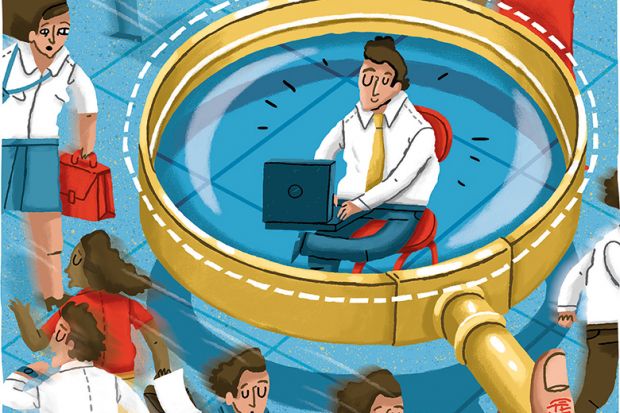What would you expect the most productive and highly cited researchers to have in common? Workaholism? Burnout? Being unrecognisable to their families?
That is what I thought when I reached out to the academics on Times Higher Education’s list of the most highly cited senior researchers in 10 subject areas, published last December. But, actually, the reverse seems to be true.
I managed to secure interviews with four of the people listed, and two things stood out in what they said. First, instead of recommending time management techniques, they talked about some surprising values that underpinned their success: humility and trust.
Second, they all claimed to have great work-life balance. This seemed extraordinary. More than a third of UK academics responding to a 2012 survey by the University and College Union said that they worked more than 50 hours a week. Two years later, that figure had risen to more than two in five. Figures are similar in the US. A former colleague of mine recently took a 40 per cent pay cut to go part-time so that he could get his evenings and weekends back (he now works 40 hours a week).
So my interviewees’ answers were music to my ears. As a researcher, I felt performance-managed and measured to within an inch of my life, but I did not want to work any harder: I wanted to become more efficient so I could get my thinking and free time back.
The silver bullet, I learned, is not a technique; rather, it is a way of thinking. All the researchers I spoke to had an uncommon ability to focus on the priorities that were most important to them. Rather than being full of pride over their achievements, I heard stories about the importance of being approachable and open to criticism; about prioritising, empowering and trusting their teams. They had no heavy heart when they had to break off from their work to help a colleague in crisis, because their team was their work, and they did not see themselves as any more important than its most junior member. As a result, they had teams that powered them to success.
Whatever your priorities, when you are clear about why you are doing what you are doing, you will do it for the right reasons, and you will do it better. So now I focus on my most important priorities, and I spend time every day pursuing them. These things motivate me because I have chosen them based on an analysis of who I am (or want to be). Rather than measuring my progress in terms of performance, I set myself daily learning targets that I know will take me closer to my goals, and I judge myself on whether I have done things consistent with my values.
Some of my priorities are work-related; others are not. But they all interact. For instance, my desire to spend time with my young family helps me to avoid working weekends or evenings when I am not travelling, and generally motivates me to take sufficient time off, which means that I remain energised and inspired by my work. Focusing on only the most vital concerns becomes a self-reinforcing cycle, as it becomes hugely motivational to realise the goals that are most important to you.
Because I am so clear about why I’m doing what I’m doing, I find it easy to say “no” to all the things that take up most academics’ time (the constant email, the meetings, the people-pleasing). It is like declining an important invitation because I have an equally important prior engagement – to myself. Of course, depending on a person’s career stage, there may be some things that they cannot refuse to do. But when most people look hard, I think they discover that they can drop many tasks with few consequences.
The result of all this is that over the past 18 months I have published two books and 14 peer-reviewed articles while submitting 15 six- and seven-figure grant proposals (four of which I have won, bringing in more than £2 million). I’ve achieved all this as director of engagement and impact for my school, and as handling editor for a journal, while also sitting on various funding panels and university committees and training more than 2,000 researchers to achieve impact via my spin-off company, Fast Track Impact.
I do not just want researchers to be more productive. I want us to be more satisfied with what we produce, and to be happy working less, and being more. The good news is that these things go together. Connecting with our values and doing things for the right reasons is a natural motivator. Greater focus and productivity is the inevitable by-product.
Mark Reed holds the Higher Education Funding Council for England and N8 chair of socio-technical innovation at Newcastle University and is visiting professor at the University of Leeds and at Birmingham City University. He is author of The Productive Researcher, published by Fast Track Impact on 11 October.
后记
Print headline: The ‘I’ way to success




